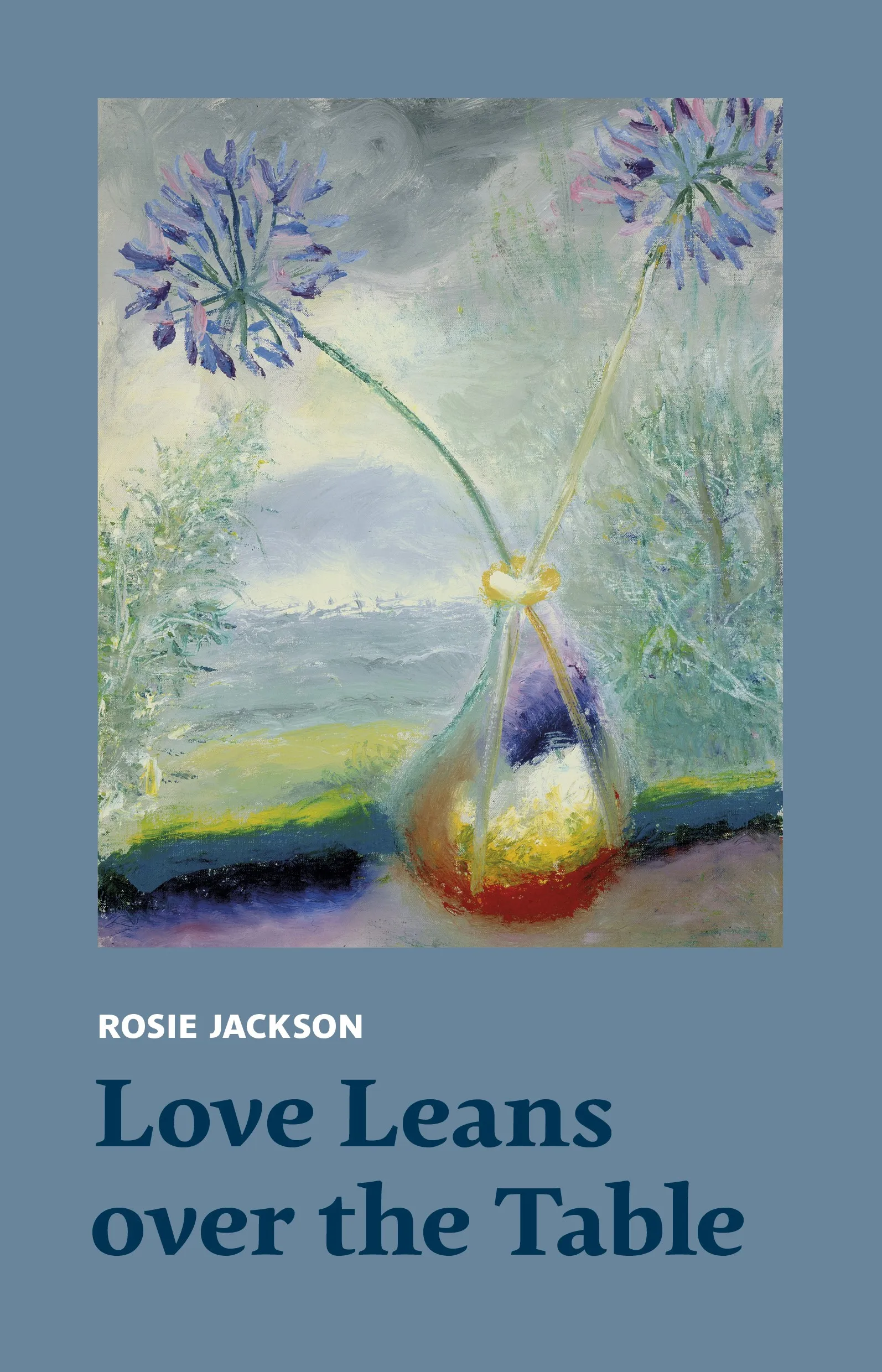
Love Leans over the Table by Rosie Jackson
Two Rivers Press, £10.99
(100 pages of poetry)
This a long, fascinatingly dense collection that bears much careful study. I never set out to read
any book in one sitting, and with my issues with reading, cannot often do so. This works in my favour, when encountering a work like this, for it deserves deep, mindful reading and thorough examination. There is much to engage with here; I found reading each poem, then visiting its section contained in the end notes greatly assisted each poem’s enlightenment, and further informed its second reading.
I am an eternal researcher, so I do find books like this especially interesting. It is a great collection
for arousing one’s curiosity.
Ekphrasis and poetic/artistic inheritance occupy the bulk of the collection – the many references and influences span a vast array of sources: historical (Hildegard, St Bede, George Fox), literary (Wendy Pratt, Marie Howe, John Donne), philosophy and spirituality (the Bible, Nietzsche, Meher Baba, Rabia of Basra), artistic (John William Waterhouse, Hieronymus Bosch, Dorothea Tanning) and contemporary (Rod Stweart, Jean Shrimpton, Joni Mitchell), to name a few.
This is a writer who has travelled through many avenues of time, life, geography, family, loss, grief, spirituality and faith – all of which are key themes in the collection. Time in this collection is wide-ranging – we move from the 8th century to contemporary life, passing through many points in history – points which have obviously struck a deep chord with Jackson, and enmeshed with formative experiences in the poet’s childhood, adolescence and adulthood.
The eternal duelling between darkness and light plays a huge role in the book and is cleverly maintained throughout. For example:
“…darkness and delirium will be shot through / like thunder riddled by light…”
“…soot…gleaming…”
“…black oak sleepers…white-laced waves…”
“…the light cleansing…”
“…when darkness lifts.
Jackson is not afraid to write as anchorite – to consider how one might well relinquish the world in order to achieve a higher spirituality and faith, find a place where a woman can feel safe yet pay in kind for it:
“Love is not the right word. Love is too cushiony / for a woman who sleeps on stone…
prays with the steadfastness of granite.”
This is a collection encompassing remedy, repair and rescue; of “unlikely angels”, “repopulated fallow ground”, “all these resurrections of our lives”. The collection asks us to celebrate and be astounded by nature’s wonders – there are wonderful hints of incantation in the book:
“…wild, purple, profligate…”
“…celandine,coastline, clearings…”
“…breeze, wind, monsoon, / mistral, boreas, sirocco…”
Find here the eternal, unbreakable connection between father, daughter and family history, pressed forever into the pages as Jackson’s memories are pressed into her father’s Bible. Amongst these flights were so many moments of personal identification to bring us wonderfully back to the ground, to connect with memories of one’s own. I found much here to chime with – pits and coal, Cleethorpes and Skegness, going to chapel, a parent’s disappointment with their spouse:
“… the soot / of Leeds…Woodbine[s]…”
“Tibshelf, Sutton, Pleasley, Clay Cross, Glapwell…slagheaps…”
“We lived over a hairdresser’s, my son’s new-born smell / polluted by shampoo and lacquer…”
“…riddling the ashes…”
Here is memoir and storytelling combined to make highly narrative poems which are highly descriptive, laden with biblical language and imagery (which I very much adore), concrete details, and lightened in places with lovely truths:
“…to fall under the spell of words, / to live near the breadline. But I learned to love margins…
I learned to hear things in shells.”
Here is faith and doubt, awakening to life’s trials and imperfections. There is longing. Jackson is not afraid to name desire, fear, or need. She is not afraid to look. There is the mental and physical anguish involved in bringing a child into this world – to come to Earth is to suffer:
“Better to have/sent him back…to that pre-formed unsuffering place of stars…”
Here, the poet finds acceptance, indeed love for the perfectly imperfect in everything, including and especially, the self:
“I’m just thankful / to have arrived at the harvest of myself, to have come through.”
“…I want to cry out…that love is surely bigger than grief, than death.”
“You can never be ready,” Jackson writes. “Trust your dream.”
Love Leans over the Table is published by Two Rivers Press and available here.
Jane Burn is a working class, pansexual, autistic person, poet, artist and essayist, who lives with her family in an off-grid rural community for eight months of the year. Places in which her essays have appeared include the Rebecca Swift Foundation, Persona Journal, The Friday Poem and The Alchemy Spoon. Since 2014, Jane’s poems have won, been placed, shortlisted, or longlisted in seventy competitions. Her poems are widely published, in magazines such as The Rialto, Poetry Wales, Butcher’s Dog and Poetry London, as well as being anthologised by presses including Seren, Arachne Press, Broken Sleep and Pan Macmillan. Jane has an MA in Writing Poetry from Newcastle University, where she was awarded the 2022 academic prize for best overall performance. Her pamphlets and collections have been published by Indigo Dreams, Wyrd Harvest, KFS Press, Talking Pen and BLERoom Press. Her latest collection, Be Feared, is available from Nine Arches.
